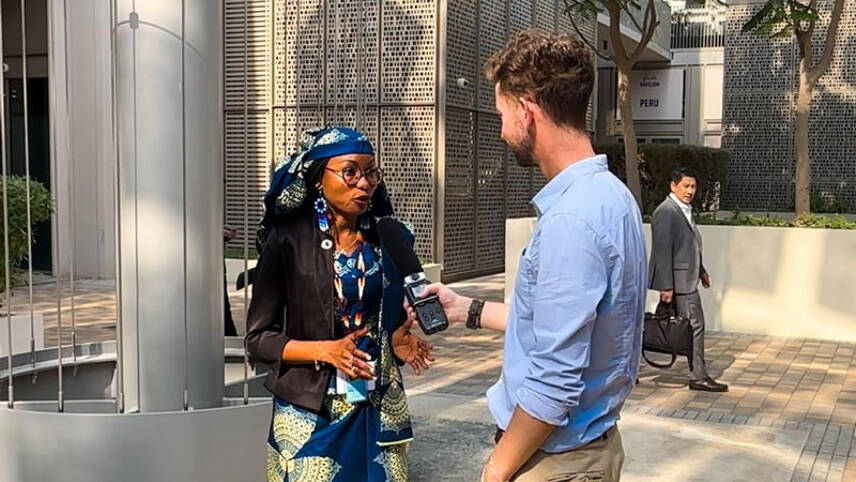Register for free and continue reading
Join our growing army of changemakers and get unlimited access to our premium content
Ibrahim spoke to edie’s publisher Luke Nicholls in the Blue Zone of COP28, the UN-convened climate summit in Dubai, this week.
She is a COP veteran, having co-directed the World Indigenous Peoples’ Initiative and Pavilion at COP21, COP22 and COP23.
She spoke of how her community, in Chad, lives on the frontlines of the climate crisis. High-level discussions at COPs are removed to an extent from the reality of her loved ones.
She said: “When we talk about climate change in my home country, Chad, we are at the concrete face. We have already reached 1.5C, the Paris Agreement’s goal for the world.
“These two extremes of weather give consequences of food insecurity; violence between communities fighting to get access to the resources; migration internally; and ways of living as a society that have changed.”
Ibrahim reflects on mixed progress on the two most meaningful roles she sees Indigenous peoples playing at COPs – influencing official negotiations and securing meaningful financial and practical support from the global community.
On the former, she explained: “COP28 has the record [for the] number for Indigenous People participating. We are over 400 in the Blue Zone, getting access to the rooms. And when you go to all the negotiation rooms… you can meet an Indigenous person. This is, really, tremendous.
“Now, this participation is not only a logistic. We want greater participation in the decisions into the outcome of this COP.. We want not only be referenced, but be active in those decisions.”
Ibrahim said she and her peers will continue to push for active observer seats in Loss and Damage rooms at future COPs, following the operationalisation and initial financial commitments to the first Loss and Damage fund at the opening of COP28.
They are also advocating for the right to advocate for a fossil fuel phase-out, not down, and to shape rules relating to Article 6. This is the part of the Paris Agreement concerning carbon markets. Ibrahim advocates for all Indigenous communities to have “free, prior and informed consent” when forest projects are developed near their land.
Accessible finance
On finance, Ibrahim was asked about the $1.7bn pledge for Indigenous-led climate solutions made two years ago at COP26 in Glasgow.
She expressed disappointment that only 7% of this finance had made its way directly to Indigenous groups within a year, because the rest went “back through the same channels – the big NGOs, the UN, the governments”.
Ibrahim elaborated: “It is not an issue of capacity, as they are saying. If we have the capacity to protect 80% of the world’s biodiversity; to protect one-quarter of the earth… if we are capturing the carbon doubly as high as anyone else around the world, why can we not manage the money?
“They must change the way they want to give the money. They must adapt to the rules Indigenous people are setting. Because, then, we know it is direct access finance. Otherwise, this is only a commitment, and commitments will never defeat all the climate action we want to have.”
Ibrahim noted that businesses and policymakers alike should learn from these past mistakes.
Reflecting on the Business and Philanthropy Climate Forum hosted at COP28 on 1-2 December, she said: “I want the business fund not to be like the one we got announced earlier [at COP26]. We want to see more than just a commitment… how the funding can reach communities directly.
“I meet so many sustainability officers from many sectors. If [companies] do have a sustainability officer and care about sustainability, they must respect the rights of Indigenous peoples and put Indigenous solutions in the middle of their business.”
Her advice was that businesses should consult with Indigenous leaders before assuming a community’s needs, and look to these people as experts in generational knowledge.
You can access all of edie’s COP28 content here.



Please login or Register to leave a comment.